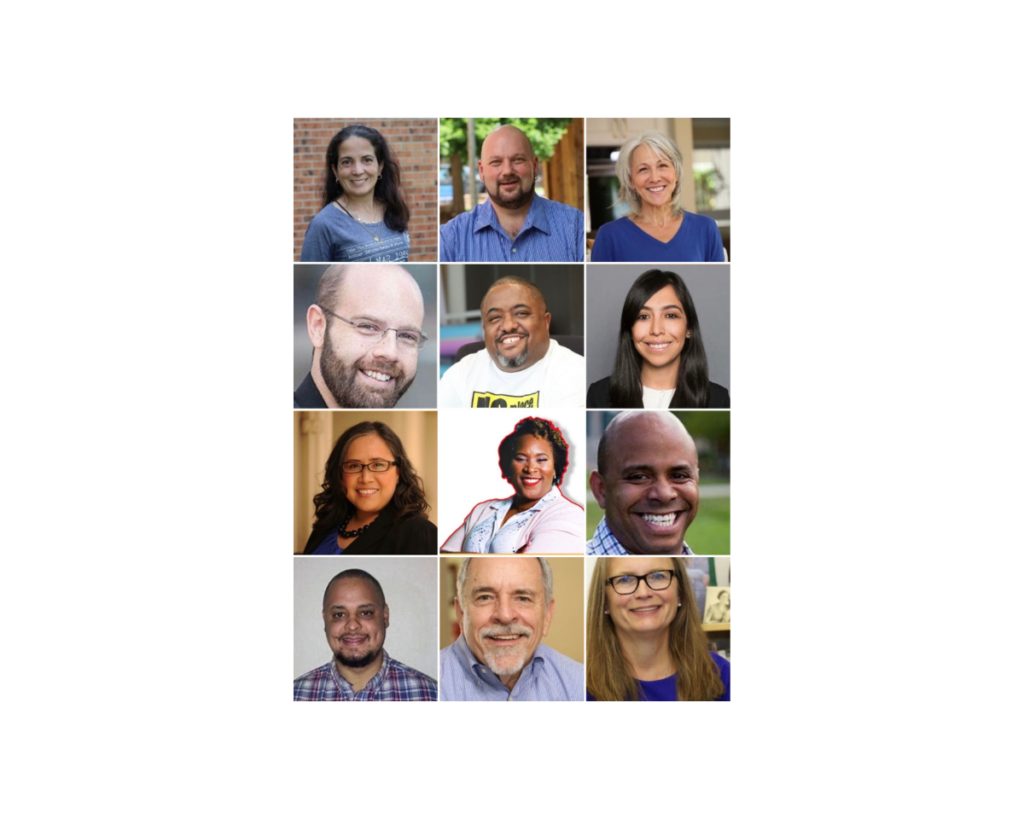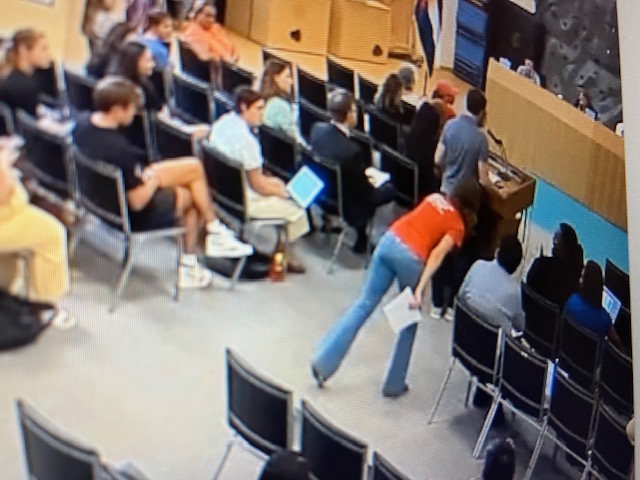Twelve of the 13 candidates running for four spots on the seven-member Denver Public Schools board sat with representatives of the Colorado Hispanic Chamber of Commerce and local journalists Wednesday night to talk about their visions for public education in Denver communities, in a live-streamed event.
Denver journalists Michelle Griego, Fernando Sergio and Jesus Sanchez Melean divided their questioning of the candidates by the district for which they were running, but asked several of them the same questions regardless of district race.
While candidates did not get to answer every question, and they each got about 90 seconds to answer, they were all able to touch on a few of the same issues.
Here’s some of what the candidates said. It is important to note that the five candidates for the District At-Large (city-wide) seat received significantly more questions to answer (in a 45-minute conversation between them) than the candidates for individual districts, who each spoke for about five minutes.
At-large candidates
Candidates for the at-large seat included homeschool mother and teacher Marla Benavides, former Denver area educators Jane Shirley and Scott Esserman, pastor and education advocate Vernon Jones and community activist Nicky Yollick.
Esserman, Jones, and Yollick touched specifically on the need for the DPS board to focus on serving students of color. Esserman and Yollick advocated for educators as well, pointing to what they see as inequity not just for Black and Brown students but also for special education teachers.
“We have to do better for our Black and Brown communities than we have, and that is the primary measurement of success [for Superintendent Alex Marrero],” said Esserman, who has the backing of the Denver Classroom Teachers Association. He also called for “eliminating discrepancies in gifted and talented education, or what it looks like eliminating discrepancies in our special education programs … It’s all going to have to come to that — how (Marrero) is using those resources to fulfill those needs.”
Yollick also brought up special education students and teachers, claiming them to be one of three groups (the other two being Black students and students and families who are learning English) he intends to focus on serving if elected.
“We’ve essentially been playing Whack-a-Mole with equity — we wait until a problem gets so bad that it’s just exploding, and everyone’s talking about it for years and years, and then we finally decide to address it. We need to stop doing that,” Yollick said. “We need to stop punishing our educators and our support staffers when they advocate for [the] needs of their special education students.”
Shirley touched on DPS’s strategic plan, called “Denver Plan 2020”— which was geared towards increasing the quality of “neighborhood schools,” and boosting confidence in low-income families and students of color that the schools nearest them would serve their academic, social and emotional needs. She said the expected results laid out in the plan lacked clarity. In her experience as a teacher and principals’ coach, she said, helping certain communities “define the results” they’re looking for will then empower the residents to speak up for what they need.
Jones, when asked what equity means to him and what it would take for DPS to enforce equitable policy, said the district still struggles with “equality,” not just equity.
“Equity to me is, first, seeing that child as an equal human, seeing that parent as an equal human,” Jones said. “When we get there, and we see every child as a brilliant child and every family as a brilliant family, we will act more equitably, but until then, we’re going to struggle.”
Benavides, focusing mostly on her experience as a homeschool teacher to her own children, repeatedly suggested DPS should be “decentralized,” and claimed that every school in the district should be run independently, with principals in charge of their budgets.
Southwest Denver candidates
In the race for Southwest Denver’s District 2, candidates Xochitl Gaytan and Karolina Villagrana spoke in favor of Denver’s multilingual learner consent decree, which is a legally binding commitment by DPS to improve its multilingual education system and better serve students who are learning English.
“I came to this country as a little girl, so I understand the needs of our immigrant communities, our refugee communities, especially our Spanish-speaking community,” the DCTA-endorsed Gaytan said. “We need to decrease the classroom size so that we’re able to provide more bilingual literacy programs throughout Southwest Denver.”
Villagrana pointed out that the consent decree requires that native Spanish-speaking DPS students have access to daily instruction in their native language while providing them with the extra help and support they need. She also said that as a teacher, it was important for her to host weekend workshops with multilingual families to help them understand what their students were being taught in both Spanish and English.
“And as an assistant principal, it was my job to make sure that teachers really understood what language progression meant,” Villagrana said, “and make sure that the lessons support our kids each and every day, and I’m still committed to that same thing.”
Central Denver candidates
The two candidates running for central Denver’s District 3, former Denver area principal Mike DeGuire and incumbent DPS board president Carrie Olson — also addressed how they felt DPS could better serve the underserved.
“It’s really important to make sure that you understand where people are coming from,” DeGuire said. “That takes time, it takes listening … We need to make sure that we understand what the concerns are from our parents, from our educators, as well as from our community members.”
Olson, who has the DCTA’s backing, said equitable education would eliminate racism and bias, and put systems in place to ensure all students and staff are receiving an “educational experience” tailored to their own needs.
Asked if the DPS budget could present an obstacle to making education more equitable in Denver, Olson said it should be viewed as an opportunity instead. “We need to listen to our school leaders and our teachers, and our families in our schools, to understand what they need.”
Northeast Denver candidates
Of the four candidates running for Northeast Denver’s District 4, three made it to the forum: Colorado Association of Infant Mental Health director and pastor Jose Silva, sixth grade math teacher Gene Fashaw, and George Washington High School parent-community liaison Michelle Quattlebaum.
The candidates echoed much of what had been said in the other district race conversations in terms of the need for equity in DPS, but also emphasized the importance of mental health support for students.
“In order to impact academic achievement, I would launch a universal assessment, just to understand where our students are at today,” Silva said. “We have to have plans and metrics, and Denver Public Schools are showing us that they don’t have plans and metrics ready to do the work.”
Fashaw is the only current classroom teacher running for the Northeast Denver seat. He said the board needs to enact policies focused on the social-emotional and mental health of students. He cited the traditional greeting of the Masai tribe in Africa, “Casserian Engeri,” which translates to “And how are the children?”
“I saw firsthand some of the things that our students are dealing with, whether that’s trauma, whether that’s struggles in the classroom,” Fashaw said, “so we have to make sure we’re … coming from a place of understanding and willingness to look at each and every child as full of potential.”
Some common themes
While questioners did not ask all of the candidates directly how they intend to balance the academic, mental, and physical health needs of students and families, many candidates touched on the importance of that when asked about their own priorities, if elected.
Yollick said DPS should be redesigning curriculums to better suit students socially and emotionally — especially now that the districts took a hit from a pandemic — setting up “learning loss centers” and one-on-one tutoring programs for students, as well as improving childcare options for educators.
When asked about the potential of a Covid-19 Delta variant outbreak, Jones recalled how his grandfather used to carry an umbrella at nearly all times “because you never know when it’s going to rain,” and used that analogy to say DPS needs to make sure it’s prepared for the impact of a pandemic on students’ well-being.
The question of declining enrollment, and how to keep families in DPS from leaving the district prompted DeGuire to say he believes the “small schools resolution” to consolidate (close) under-enrolled, under-performing schools was “premature.” Olson did not say whether she agreed or disagreed with this, but she did say she was concerned about the effects closing schools would have on surrounding communities.
“I think we need to rely on school leaders, teachers and the community to hear what ideas they have,” Olson said regarding enrollment.
Quattlebaum, the DCTA-endorsed candidate, was asked about the closing of Montbello High School and what could be learned from it (recently DPS resolved to reopen the school next year). She said she understands the impact of school closures firsthand because her son was a member of Montbello’s last graduating class. Similar to Olson, though, she said the way to minimize the negative effect of closing schools is to involve the surrounding communities in the conversation before doing anything.
Piggybacking on what her opponents had said earlier and circling back to her view on equity, Quattlebaum posed the question of how to reinstill “pride” in DPS.
“When I talk about educational opportunity, layered in there is…making sure that our students and our teachers of color feel supported, feel heard, and continue to have that same excitement and drive to remain in Denver Public Schools,” Quattlebaum said. “And then, mental health — we have to address the social and the emotional well-being of all of our students … If you’re not right socially and emotionally, you can’t learn.”




